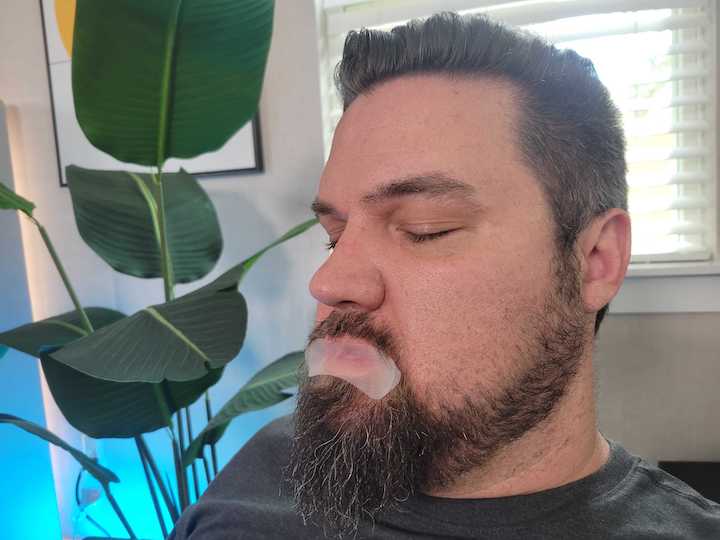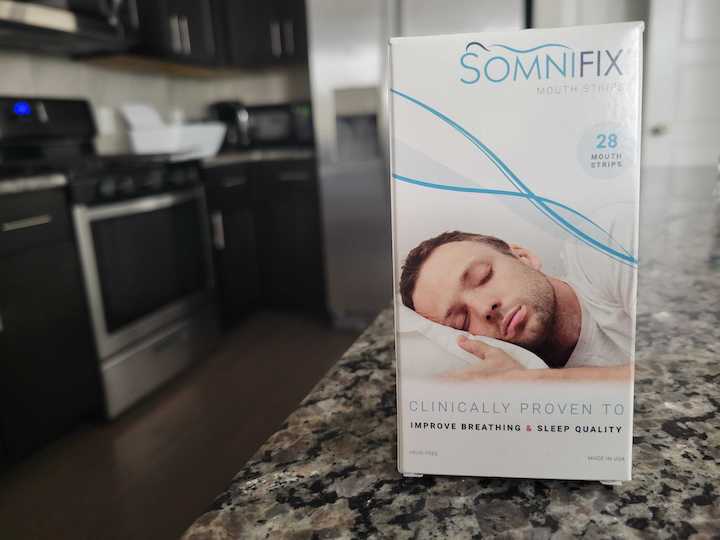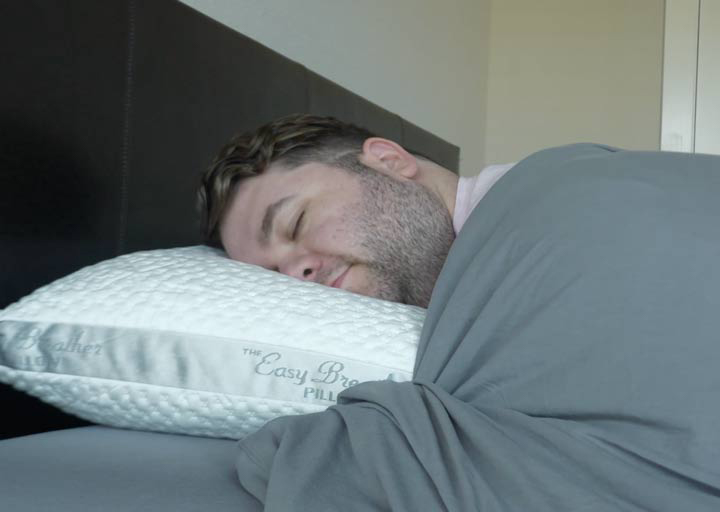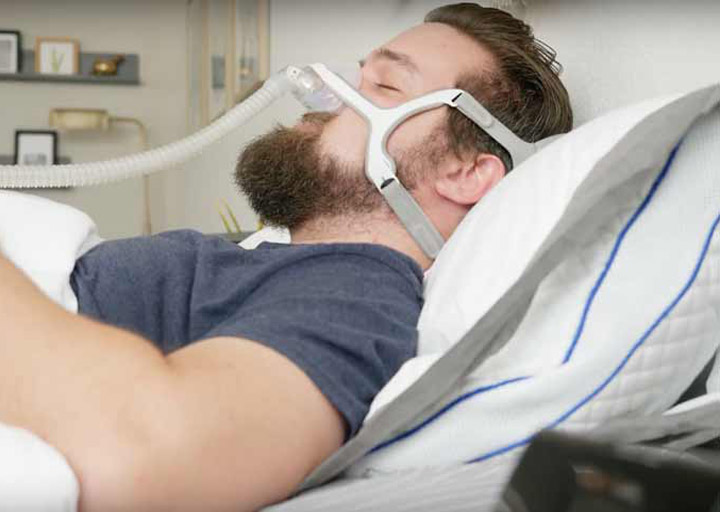If you’ve scrolled through TikTok, you may have heard about the mouth taping trend. Mouth taping is the practice of placing an adhesive over your lips to keep your mouth closed during sleep. Because it removes the option of breathing through the mouth, you are encouraged to breathe through your nose.
But is mouth tape safe for sleep? I consulted medical professionals and read the latest peer-reviewed research to find out. Keep reading to learn more about the benefits and drawbacks of mouth tape for sleep.
Fast Facts
- Mouth taping is the practice of using special tape to keep the lips together during sleep.
- Mouth taping gained modern popularity on TikTok and other social media as early as 2022, with many beauty creators claiming a myriad of unproven health benefits.
- People generally turn to mouth taping to encourage nose breathing instead of mouth breathing, which gives your nose a chance to change the temperature and humidity of the air, and even remove toxins.
- Mouth breathing while sleeping increases your risk of developing a sleep disorder like sleep apnea, snoring, and hypopnea.
- Mouth taping can potentially help mild sleep apnea, improve snoring, and lower blood pressure.
- You should speak to your doctor before mouth taping to make sure it does not put you at risk for complications.
- Mouth taping can be dangerous. Side effects include anxiety, trouble breathing properly, and skin irritations.
What is Mouth Taping?
Mouth taping—in which people quite literally tape their mouths shut—began as a means of preventing breathing through the mouth. Mouth breathing can have negative effects including dry mouth, bad breath, hoarseness upon waking, snoring, and more. Chronic mouth breathing can also cause sleep disorders, like sleep apnea and changes to facial structure.

However, “Mouth taping is not widely recognized as a well-established method to prevent mouth breathing during sleep,” says Dr. Raj Dasgupta, chief medical advisor for Mattress Clarity. “There is limited evidence on its benefits, and I would recommend talking to your health care provider before attempting it.” That’s especially important if you have a sleeping disorder like obstructive sleep apnea.
History of Mouth Taping
Mouth taping gained momentum in 2022 thanks to social media platforms like TikTok. That’s when influencers began claiming multiple health benefits as a result of mouth taping, which was adapted from a technique that originated in Russia.
The idea of mouth taping evolved from the Buteyko technique, a Russian breathing practice designed to help people with asthma possibly control their symptoms. It was adapted in the West as a means of encouraging nose breathing over mouth breathing, with many Buteyko practitioners advising their patients to use porous medical tape to seal their mouths closed at night. The trend made its way to social media platforms, where the practice reached a vastly wider audience.
How to Tape Your Mouth For Sleep
If you want to try the mouth taping trend, speak with your doctor first. They can help you rule out respiratory conditions or nasal obstructions that can make the practice dangerous.

“Sleep apnea often goes undiagnosed, and many people may not know that they have it, so it’s best to be evaluated by your doctor or a sleep specialist before trying mouth tape for sleep,” says Dr. Dasgupta.
If your doctor gives you the all-clear to proceed, here’s how to tape your mouth for sleep.
- Begin by finding the right mouth tape. “Use mouth tape designed specifically for this use,” says Dr. Laura Purdy, board-certified family medicine physician, and don’t substitute it with household tape of any kind, which can be damaging to the sensitive skin on your lips. Instead, look for a breathable, hypoallergenic tape that’s intended for use on and around the mouth.
- Prepare the area. Follow your usual nighttime oral hygiene and skincare routine, then dry your mouth and the skin around it thoroughly. Then, follow the directions on the packaging to adhere it properly.
- Practice during the day. It can be helpful to test mouth tape before using it for sleeping. That helps you determine your personal comfort level with mouth tape. Pay close attention to how you feel with your mouth sealed shut — it can help you decide whether the technique works for you.
What Are The Potential Benefits of Mouth Taping For Sleep?
Research into the benefits of mouth taping is limited, so any health claims should be taken with a grain of salt. However, some small studies and anecdotal evidence suggest that mouth taping for sleep has a few things going for it.
- Nose breathing. The biggest benefit of mouth taping is that it may promote nose breathing. “Nose breathing has benefits because it filters out dust and allergens with tiny hairs called cilia in your nose, protecting against germs and debris that your mouth can’t,” says Dasgupta. “Nose breathing also adds moisture to the air before it reaches your lungs, which your lungs prefer over dry air that can be irritating.”
- Helps with snoring and mild sleep apnea. A small study of 20 participants with obstructive sleep apnea, who breathe out of their mouths, found that mouth taping with 3M silicone hypoallergenic tape lessened symptom severity, including snoring. But Dasgupta tells Mattress Clarity, “if you have obstructive sleep apnea, taping your mouth closed while sleeping can be very dangerous.”
- Improved oral health. Chronic bad breath, also called halitotis, can be the result of mouth breathing, which affects saliva flow intended to help keep the mouth clean. By removing the option of mouth breathing, mouth tape practicers may find that the smell of their breath improves. Some dental professionals also think that mouth taping could help reduce bruxism, or the involuntary grinding of teeth, since mouth breathing has been linked to it. .
- Helps with asthma symptoms. There is contradictory evidence regarding nasal breathing and asthma Although, a study from 2009 that looked specifically at mouth taping as a treatment option for people with asthma found that it wasn’t effective. So, it’s likely not helpful with asthma symptoms, and you should always talk to your healthcare provider before trying.
Mouth Breathing vs Nose Breathing
While most people may naturally breathe through their noses, some are born as mouth breathers or develop the habit later in life. In some cases, it’s something they do only while they’re sleeping.

But the nose processes air differently than through the mouth. “Our bodies are designed to breathe through the nose so there are absolute benefits to this over mouth breathing,” says Purdy.
Benefits of Nose Breathing
- Filters out debris, allergens and irritants. Cilia, or small hairlike structures in the nostrils, acts as a filter to catch particles when you inhale. They can help prevent these small particles from entering your lungs.
- Warms and humidifies air. “Breathing through your nose humidifies and warms the inhaled air, creating moist air for your lungs over dry air coming from your mouth,” says Purdy. “This will also likely cause less irritation and increase airflow and oxygen.” That doesn’t happen in the mouth, which is why dry mouth and a sore throat can both be side effects of mouth breathing.
- Lowers blood pressure. According to Dasgupta, breathing through the nose “might also help lower blood pressure by releasing nitric oxide, which widens blood vessels.”
Negative Effects of Mouth Breathing
- Increased risk of oral health issues. Breathing through the mouth can draw in dry, unfiltered air, which can dry out the gums and tissues in the mouth. That can lead to gum disease or tooth decay.
- Increases the risk of developing sleep apnea and snoring. Research has found that nasal obstruction is possibly a risk factor for sleep-disordered breathing, including apnea and snoring. These conditions may affect sleep quality, leading to daytime fatigue and irritable mood.
- Can affect bone structure and appearance. Children who breathe through their mouths may be at risk of changes to their facial structure and development.
Dangers of Mouth Taping
While Purdy says that mouth taping is generally safe for those who have no respiratory or sleep disorders, there can still be drawbacks. Purdy says that some people may experience sleep disruptions when they begin using mouth tape, as it’s a practice that takes some getting used to. Other potential side effects include:
- Anxiety. Since mouth tape impedes your ability to take in a full, deep breath, some people may experience anxiety or discomfort when they use it. That’s especially true if they don’t regularly breathe through their noses. That’s why it’s a good idea to practice mouth taping during the daytime before trying it at night.
- Skin irritation around the mouth. “Mouth tape can cause side effects on the skin like skin rashes or other irritations especially if you have sensitive skin,” notes Purdy. For some people, allergic reactions to the adhesive on the tape can also be a concern.
- Aspiration. In the event of vomiting or acid reflux when the mouth is taped, stomach contents could enter the lungs — and the health consequences can be serious.
Experts warn that mouth taping isn’t for everyone. People with the following conditions should not use mouth tape:
- heart or lung problems
- Nasal breathing problems
- A cold, or an ear or sinus infection
- Obesity
Mouth taping should also be avoided if you have consumed alcohol or taken sedatives.
Alternatives to Mouth Taping
If you’re considering mouth taping to promote nose breathing at night, there are other methods you might want to explore.
“You really should look at the root cause of why you are breathing through your mouth and consult with a doctor,” says Purdy.
- Nasal strips or nose dilators. These products are used over or in the nose to help improve nasal breathing. “Anti-snoring devices like nasal strips or nasal dilators open up your nose for better airflow, reducing snoring,” says Dasgupta.
- Change sleep positions. You might try sleeping on your side instead of your back, which improves how the air moves through your throat and may also help minimize snoring, according to Dasgupta.
- Decongestants. If you’re breathing through your mouth because of a stuffy nose, over-the-counter decongestants can help clear your airways so that it’s easier to breathe. Speak to your doctor if you suspect you may have allergies. You might also consider using a humidifier. “Using a humidifier adds moisture to the air, which helps ease stuffy noses and makes breathing easier by keeping nasal passages moist,” says Dasgupta.
- Oral appliances. A custom-fitted mouthpiece can help hold the jaw or tongue in a position that minimizes snoring and they also help limit mouth opening. These oral appliances are typically prescribed and ordered by a dentist or oral healthcare provider.
- CPAP machine. A continuous positive airway pressure (CPAP) machine may be used to treat sleep apnea. If you suspect you may have sleep apnea, speak to your doctor.
Keep in mind that these methods won’t be applicable in every scenario. If you’re concerned about mouth breathing, it’s best to discuss it with your doctor.

Tips for Better Sleep
- Routine. Following a regular sleep schedule as part of healthy sleep hygiene can make it easier to fall asleep. That’s because the body learns when it’s time for bed.
- Reduce eating and drinking before bed, especially alcohol. Alcohol is a depressant that can make it easier to fall asleep, but it can contribute to disturbances to your circadian rhythm. And since metabolism and sleep are closely linked, it’s best to stop eating and drinking about three hours before bed. This gives the body time to digest properly.
- Stress management. Stress and sleep can go hand in hand. Sleep can help decrease cortisol levels, while a lack of sleep can cause cortisol levels to rise. Taking steps to manage stress in healthy ways, such as exercise, breathwork, or meditation, can help calm the body and mind so that it’s easier to drift off.
- Limit screen time before bed. Screen use can hinder sleep quality, and research suggests that limiting exposure for at least 30 minutes before bed can help. The longer you avoid screens before bed, the better likely.
Summary
While mouth taping has its share of outspoken proponents, there isn’t much in the way of definitive research that supports its purported health benefits. While there are benefits to breathing through the nose instead of the mouth, it’s important to identify the cause of mouth breathing in order to find the most appropriate solution. The experts I consulted both recommend speaking with your doctor before attempting mouth taping for sleep.
FAQs
Is nose breathing good for you?
Yes. Breathing through the nose filters dust and allergens, which protects against germs and debris in a way that the mouth can’t replicate. “It also adds moisture to the air before it reaches your lungs, which your lungs prefer over dry air that can be irritating,” says Dr. Dasgupta.
Why is it difficult to breathe through my nose?
You may experience problems breathing through your nose if you’re congested or have allergies. In some cases, conditions like enlarged adenoids or a deviated septum are physical hurdles to breathing through the nose.
Does mouth taping help with snoring?
Some research suggests that mouth taping can help with snoring, but more studies are needed.
Is mouth taping dangerous?
It can be if you have any health condition, like sleep apnea. It’s important to speak with your doctor before you try mouth taping for sleep.


